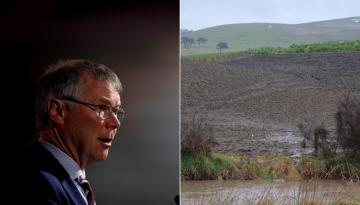An advisory group in Southland has made a number of recommendations to the Government around winter grazing.
The group is calling for a rethink of pugging rules and the removal of resowing dates.
The Southland Advisory Group was formed in September after the Government introduced new freshwater rules.
The regulations, which the Government says are necessary to protect the country's rivers and lakes, have been heavily criticised by some in the farming world for being "unworkable" and "impractical".
The new intensive winter grazing regulations come into force in May 2021 as part of the Essential Freshwater package.
The recommendations and a report by the Southland Advisory Group are now being considered by Environment Minister David Parker and Agriculture Minister Damien O'Connor.
The group is made up of two farmers, as well as representatives from DairyNZ, Beef + Lamb New Zealand, Environment Southland, Federated Farmers and Fish and Game.
"While we support the intent of the Government's regulations, which is to protect the environment, the rules need to be fair, reasonable and achievable," said DairyNZ strategy and investment leader Dr David Burger.
"We know farmers have made significant strides in improving their wintering planning and care for the environment and animals, and acknowledge there’s more to do – we are on the journey."
O'Connor said that while most farmers had worked to improve their practices, winter grazing still took its toll on the environment.
"Stricter scrutiny of this practice is required to reduce harm and manage increasing risk," he said.
Parker said there had been a "significant impact" on the quality of the country's waterways over the past 20 years from farming, with cow numbers increasing sixfold and winter cropping areas increasing dramatically.
Earlier this year farmers in Southland threatened to boycott some of the winter grazing rules, in an effort to make it clear they weren't happy.
The Government subsequently made a few adjustments to the rules, but some farmers say a complete overhaul is needed.
While the Government has hinted more changes could be on the cards, it is unlikely to rewrite them from scratch.
"We will look at the implementation challenges described, and consider options to address them," Parker said.
"The health of our environment will be at the centre of any decisions made. The group's report puts forward a range of options they say will lead to better environmental outcomes.
"Southland estuaries have become increasingly clogged with sediment and this needs to be addressed. So any changes would need to sit alongside increased monitoring and reporting requirements to ensure there are measurable improvements."
The group said it agreed with the Government that farm plans are necessary for managing freshwater but recommended while these are rolled out work should commence on an interim step - an intensive winter grazing module.
"This would enable farmers to identify the specific risks on their property and identify the good management practices they implement to mitigate the impacts on freshwater."
The group also recommended that "the pugging and resowing date conditions should be removed", as well as recommending a new measure focusing on the management of critical areas.
"Pugging and resowing rules would lead to perverse outcomes, but managing critical source areas would lead to improved environmental health. The recommendation suggests these areas are protected within intensively grazed areas via buffers."


